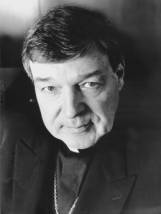
A federal court in the US recently ruled that school board members in Dover, Pennsylvania had violated the constitution when they ordered the biology curriculum must include the intelligent design theory.
But why does there have to be a conflict between Evolution and Intelligent Design theories?
The Intelligent Design (ID) theory examines how nature reveals the evidence of the work of an artist or designer. If we take the examples within science we see forensic studies the evidence whether someone died of natural causes or whether some other intelligence was involved in the death of the deceased.
ID enthusiasts include Philosophers of Science and Scientists with Professors of Biology featuring prominently. Science has phenomenally revealed much within the field of Biology, especially regarding DNA and proteins.
It is staggering that people claim that science should be naturalistic.
But the ID theory does not include or exclude a personal God. Examples include DNA in which the four base pairs (A, C, T, G) reveals a code which according to Bill Gates holds several trillion times as much information than that of our most advanced computer chips. The computer works on a binary, or two code system - zeros and ones.
ID does not include coincidences with intelligent design. A rough looking shape on cliffs does not reveal design. However if paint was involved or intricate patterns revealing a Davinci-like precision would be an example of ID.
According to Stephen Hawking, the origin of life theory, The Big Bang, was so precise that the galaxies would not have formed if the rate of expansion following the Big Bang was smaller by one part in a hundred thousand million million.
ID proponent and mathematician, William Dembski, reveals the contrast should not be between invoking supernatural causes vs natural, but undirected natural causes and intelligent causes. Undirected natural causes can throw scrabble pieces onto a table, but an intelligent cause is needed to arrange the pieces into meaningful sentences.
Intelligent Design does not rule out evolution, except an atheistic evolution which claims that a creator never existed.
ID exponents also use the Bacteria Flagellum example. This natural beauty has a propeller which revolves at 100,000 revolutions per minute. Magnified 50,000 times with an electron micrograph a driveshaft, u-joint, stator, etc can be observed. What was shown was a molecular outboard motor. It showed a sophistication far superior to that designed by humans, with a quarter turn the propeller can stop and rotate 100,000 rpms in the other direction.
With the furor surrounding ID the New Zealand media has not covered the fact that leading scientists have converted from an atheistic view of evolution. US proponents include previously agnostic Prof. Antony Flew (though not to a personal God) and one of the leading chemical evolutionary theorists in the world, Dean Kenyon. His aim was to explain the origin of life on earth and particularly the origin of all 30,000 proteins by purely natural processes. But doubts arose to how proteins could be assembled without the help of genetic instructions (DNA). He was led to the ID theory as it matched multiple discoveries made through molecular biology. Australian physicist and author Paul Davies states that through his scientific work more and more he is coming to believe that the physical universe was constructed with an astonishing ingenuity. However he believes that for one to call this God is a matter of taste and definition.
In fact an American survey by Sociologist James Leuba conducted in 1914 found 40% of American scientists believed in the existence of God. When the survey was repeated 80 years later, astonishingly the result was the same, 40%.
As covered in my book "God:Fact or Fiction?" Natural Selection reveals purpose and mind-like qualities. For it selects only for functional advantage or eliminates what is not advantageous. Could not this Natural Selection have been instigated by a Creator?
If it was a case of ID or Creationism vs Evolution it would mean that all life in the universe, including ourselves, came to exist as a result of chance or blind luck. However statistically the likelihood that life happened by chance is very remote. In fact Sir Fred Hoyle equates it to lining up 1050 blind people, giving each a Rubik’s Cube and they all solve the puzzle at the same time. But nature would not have to complete this wonder just once, but thousands, if not millions of times, for Natural Selection could not work on something that did not exist or was not living.
Scientists claim that any odds beyond 1 in 1050 have a zero possibility of happening. In fact Sir Hoyle claims that the possibility of the formation of life from inanimate matter is one to a number with 40,000 noughts after it. The proponents of ID merely want to include a theory which gives evidence to life having been programmed to exist and yes even to evolve. Therefore Evolution can beat at the heart of Intelligent Design.
Brendan Roberts is author of three books. His latest selling in Europe, the US and New Zealand, "God:Fact or Fiction?:Exploring the Relationship between science, religion and the origin of life" covers such subjects as Evolution and Intelligent Design.
ReligionRoman CatholicChristianityCatholic Blogs





